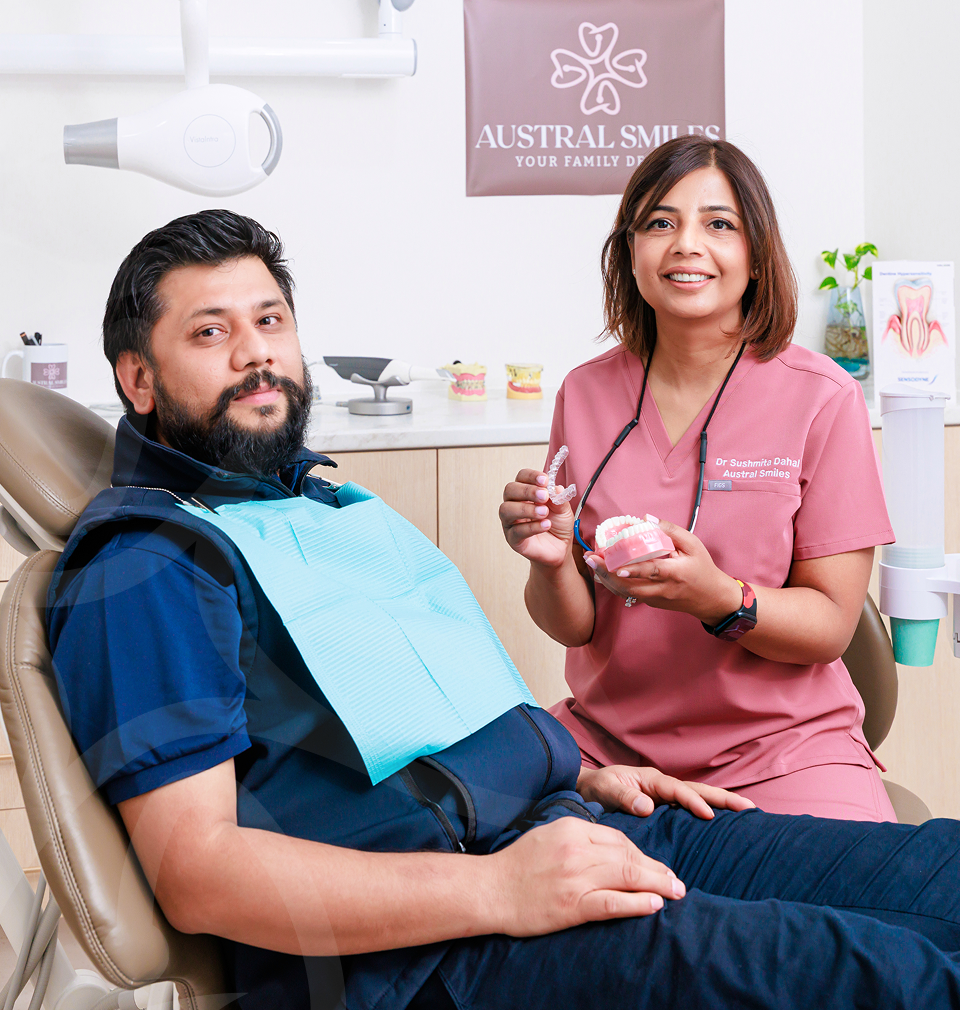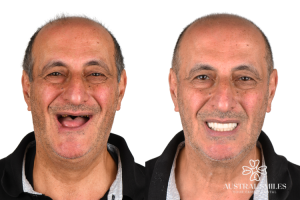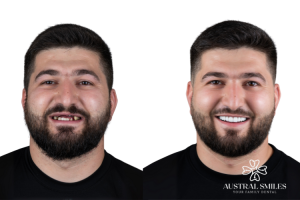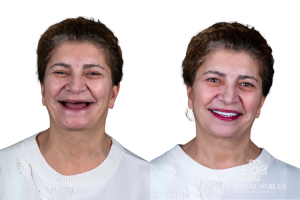Restore Your Smile with Confidence
Dental Implants Austral Locals Choose

Get Quality Tooth Replacement in Austral with Dental Implants
Missing teeth can affect your ability to chew comfortably, speak clearly, or smile without hesitation. Over time, gaps may also contribute to changes in your bite or jawbone.
Dental implants in Austral provide a secure way to replace missing teeth. They are designed to mimic natural tooth roots and can support both function and appearance. The team at Austral Smiles will guide you through every step of your care.

Are You a Candidate for Dental Implants?
Dental implants may be an option for many adults with missing teeth. A qualified dental professional must assess the individual’s suitability during a personalised consultation.
Good general health
People with stable general health and no uncontrolled chronic conditions are often considered for implants. Health checks help determine readiness for this type of procedure.
Healthy gums
Gum health plays an essential role in implant success. Patients with active gum disease may require treatment first to create a more stable foundation for implants.
Sufficient bone volume
Adequate bone in the jaw is important for supporting implants. If there is bone loss, additional procedures may be considered before implant placement.
Non-smokers or light smokers
Smoking can interfere with the healing and integration of implants. Those who smoke may be advised on ways to reduce risks and improve long-term outcomes.

Enjoy Long-Term Benefits with Dental Implants
Dental implants are designed to support comfort, oral function, and confidence. Adults seeking reliable tooth replacement options in Austral widely choose dental implants because they offer long-lasting advantages for everyday life.
Natural-feeling stability
Implants are anchored into the jawbone, offering a secure feel similar to natural teeth. This helps with chewing and everyday confidence when speaking or eating.
Support for the jawbone
Unlike removable options, implants stimulate the bone beneath the gums. This may help maintain bone structure and prevent gradual shrinking over time.
No impact on nearby teeth
Unlike dental bridges, implants don’t rely on neighbouring teeth for support. This helps preserve the natural structure of healthy surrounding teeth.
Low-maintenance care
With regular check-ups and consistent home care, implants can be maintained similarly to natural teeth using a toothbrush, floss, and dental hygiene routines.

Book Your Dental Implant Consultation Today
Before and After Smile Transformations
Discover real patient smile transformations in our gallery! Keep in mind that every smile is unique, so results may vary.

Dental Implants

Dental Implants

Dental Implants

Dental Implants

Dental Implants

Dental Implants

A Gentle, Supportive Journey
We know implant treatments can feel like a big step. That’s why we focus on clear communication, gentle techniques, and creating a stress-free experience from consultation to the final smile.
Flexible Payment Options
Investing in dental implants is investing in your well-being, and we’re here to help make them more accessible with flexible payment plans that ease the pressure.
Long-Lasting Confidence
We use durable materials and proven implant techniques designed for beautiful results and long-term performance.
Experienced Dentists
With over 30 years of combined experience, our team brings skill, advanced training, and genuine care to every implant we place to help you smile, chew, and laugh with confidence again.
Restore Your Smile and Everything That Comes With It
Restore Your Smile and Everything That Comes With It
At Austral Smiles, we combine professional dental care with genuine local hospitality, creating a positive, trusted experience for families in Austral and surrounding suburbs.
 A Gentle, Supportive Journey
A Gentle, Supportive Journey
 Long-Lasting Confidence
Long-Lasting Confidence
 Flexible Payment Options
Flexible Payment Options
 Experienced Dentists
Experienced Dentists

Payment Options
We offer a range of flexible payment options to help make your dental care more manageable.
We Accept All Health Funds

Meet the Experienced Dentists at Austral Smiles
Get to know our friendly dental team, each dedicated to providing personalised care to improve your smile and oral health.
Dr. Sushmita Dahal
DEN0001028720, General Dentist
With over 18 years of experience, Dr. Sushmita Dahal has worked across private, public, and not-for-profit clinics in Australia. She combines technical precision with creative skills in dental artistry and smile rehabilitation.
Learn MoreDr. Mamata Maharjan
DEN0001586185, General Dentist
Dr. Mamata Maharjan has over 15 years of clinical experience in Sydney’s public and private sectors. She focuses on preventive dentistry, root canal therapy, and clear aligner orthodontic treatments for adults and teens.
Learn MoreDr. Bandana Shakya
DEN0001148239, General Dentist
A graduate of Progressive Orthodontic Seminars (USA, 2015), Dr. Bandana Shakya offers implants and orthodontic treatments. She provides Invisalign®, ClearCorrect®, Spark®, ClearPath® aligners and performs complex wisdom teeth extractions. She also completed implant training with Osstem.
Learn MoreDr. Sarita Adhikari
DEN0001677199, General Dentist
Since graduating in 2004, Dr. Sarita Adhikari has delivered preventative, cosmetic, and restorative dental care. She promotes patient education, empowering individuals to take active roles in managing their long-term oral health.
Learn MoreAustral Smiles
average rating
ADA
Member


Frequently Asked Questions About Dental Implants
Explore answers to common questions about the process, care, risks, and recovery after dental implants.
How much do dental implants cost?
- Type of implant procedure: Single implants are less costly than full-arch options like All-on-4.
- Need for additional treatments: Bone grafts or sinus lifts may be required if jawbone support is limited.
- Materials used: Titanium and zirconia differ in strength, appearance, and price.
- The complexity of the case: The implant location and oral health condition may affect time and cost.
- Technology and lab work: Custom crowns, digital scans, and 3D imaging can add to the expense.
For a personalised quote for dental implants in Austral, book an implant consultation at Austral Smiles. You’ll receive a detailed plan with itemised pricing before proceeding with the treatment.
Are dental implants covered by health funds?
Some private health funds may contribute to the cost of dental implants, depending on your level of dental cover.
In most cases, health funds may assist with specific parts of the procedure, such as the surgical placement or final crown.
Factors that affect your eligibility for cover include the following:
- Type of dental cover: Comprehensive plans are more likely to include major procedures.
- Waiting periods: Many health funds apply waiting times before support is available for higher-cost treatments.
- Annual claim limits: Most funds set a yearly maximum amount for dental claims.
- Service categories: Some funds may cover crowns or prosthetic components but exclude implant surgery.
- Individual fund rules: Each provider has different terms, so it's important to confirm directly with your provider.
Austral Smiles will provide an itemised treatment plan you can use to check your dental cover before proceeding.
Are dental implants worth it?
Dental implants are often chosen for their strength, appearance, and ability to replace teeth without affecting nearby natural teeth. They can support long-term oral health and improve comfort when speaking or chewing.
Here are some reasons many patients consider them a worthwhile option:
- Natural function: Implants feel stable and work like real teeth, unlike removable dentures.
- Jawbone preservation: They help prevent bone loss that can occur after losing a tooth.
- Longevity: With proper care, implants can last many years, offering lasting value.
- Aesthetic appeal: Implants are matched to your existing teeth for a natural, balanced smile.
- Ease of care: You care for them like your natural teeth, with brushing, flossing, and regular dental visits.
Although the cost is higher upfront, many patients find that the long-term benefits of dental implants in Austral outweigh the initial expense.
What are the pros and cons of getting dental implants?
Pros:
- Strong and secure feel: Implants are placed in the jawbone, providing stability for chewing and speaking with confidence.
- Support for jawbone health: They help reduce bone loss, which often occurs when a tooth is missing for a long time
- Lifelike appearance: The crown matches the shape and shade of nearby teeth for a natural look.
- No impact on other teeth: Unlike dental bridges, there's no need to alter surrounding teeth to support the implant.
- Simple care routine: Regular brushing, flossing, and dental visits are usually all that's needed to care for implants.
Cons:
- Higher upfront cost: Implant treatment often involves a greater initial investment compared to dentures or other tooth replacement options.
- Longer process: It may take several months for the implant to integrate with the bone before the final crown is placed.
- Surgical placement: The procedure involves minor oral surgery, which includes some recovery time.
- It may not suit everyone: People with uncontrolled medical conditions or poor bone quality may require alternative treatments.
Austral Smiles can assess your oral health and walk you through what to expect based on your individual needs.
How painful is getting a dental implant?
Most patients describe dental implant procedures as more comfortable than expected. Modern techniques, including local anaesthesia and sedation options, help manage any discomfort during the surgery itself. Some mild soreness is common after the procedure, especially in the first few days.
You may experience:
- Tenderness around the implant site: This usually feels similar to a mild toothache or dull soreness and can often be managed with over-the-counter pain relief.
- Swelling and minor bruising: These symptoms typically peak within 48 hours and gradually settle over a few days.
Most people return to work and normal activities within a few days after placement. Our team provides tailored aftercare support for those undergoing dental surgery in Austral.
How long do dental implants last?
Studies report that the success rate of dental implants ranges from 90 to 95 percent over 10 years. Despite this high rate, complications can still occur and remain one of the main challenges in implant dentistry.
- Incomplete bonding with the bone: After placement, the implant must fuse with the jawbone in a process called osseointegration. If this does not occur fully, the implant may become loose or unstable.
- Poor healing due to smoking: Tobacco use reduces blood flow to the gums and bone. This can interfere with healing, making the area more prone to infection or delayed recovery.
- Infection around the implant: Bacteria can build up around the gum line, leading to inflammation and bone loss. This condition, known as peri-implantitis, can cause the implant to fail if not managed early.
- Weak or insufficient bone: If the jawbone lacks thickness or density, it may not provide enough support. In these cases, bone grafting may be required before implant placement.
- Chronic health conditions: People with uncontrolled diabetes or autoimmune disorders may experience slower healing, which can affect the implant's long-term stability.
- Teeth grinding or bite pressure: Constant clenching or grinding can place excessive force on the implant and crown, which may damage the supporting structures over time.
Austral Smiles takes time to evaluate each patient’s health, bone structure, and oral habits before planning any implant procedure.
What is the failure rate of dental implants?
Dental implants are considered a dependable option for replacing missing teeth. However, a small percentage may fail either early in the healing phase or later during regular use.
In a study of more than 1,000 implants, early failure occurred in 6.68% of cases. The following factors were linked to higher rates of early failure:
1. Lack of antibiotic use before surgery
Patients who did not receive antibiotics before the procedure experienced a much higher failure rate—over 44%—compared to 4.6% of those who did. Antibiotics help reduce the risk of infection after implant placement.
2. Placement in a fresh extraction site
Implants placed immediately after a tooth was removed were more likely to fail than those placed after the area had healed. Early placement may interrupt bone healing or lead to poor stability.
3. Poor bone density
Soft or low-density bone, such as D3 or D4 types, showed higher failure rates than denser bone. Weak bones may not hold the implant securely during healing.
Late-stage failures can also occur due to infection, teeth grinding, or gradual bone loss under the implant. An implant dentist in Austral will assess bone density, medical history, and healing ability before proceeding.
What are the side effects or risks of dental implants?
While dental implants are widely used and have a high success rate, some side effects and risks may occur, especially during the healing period. Understanding these risks can help you know what to expect and when to seek advice.
Common side effects include the following:
- Temporary pain and swelling: It is normal to feel mild discomfort at the implant site after surgery. Swelling of the gums or face may last a few days.
- Bruising of the skin or gums: Minor bruising can develop around the surgical area but usually fades within a week.
- Bleeding at the site: Some light bleeding is expected on the day of the procedure, but it usually settles with gauze and rest.
Less common risks include:
- Infection: Bacteria may enter the gum tissue during or after surgery, especially if the area is not cleaned well. In some cases, this can lead to inflammation or bone loss.
- Nerve injury: Disrupting a nerve during placement may result in tingling, numbness, or pain in the lips, chin, or tongue. This is uncommon and often temporary.
- Sinus complications: Implants placed in the upper jaw may protrude into the sinus cavity if there is not enough bone height.
- Implant mobility: If the implant does not integrate well with the bone, it may feel loose or become unstable.
Austral Smiles will guide you through the recovery process, give post-procedural instructions and monitor your healing to address any concerns early.
What's the difference between implants, dentures, and bridges?
Implants, dentures, and bridges are all used to replace missing teeth, but they work in different ways and offer different benefits.
1. Dental implants
An implant is a small post placed into the jawbone. It supports a crown, bridge, or denture and is designed to feel and function like a natural tooth. Because it connects to the bone, it stays stable when chewing or speaking.
2. Dentures
Dentures are removable plates that replace several or all missing teeth. Full dentures rest on the gums, while partial dentures attach using small metal clasps. They can be removed for easy cleaning. Dentures may shift or loosen with time.
A bridge replaces one or more missing teeth by using the nearby teeth for support. These supporting teeth are shaped to hold the bridge in place. Once fitted, a bridge stays in the mouth and does not need to be removed at night.
Each option has its care routine, cost, and lifespan. Your dentist can help you compare missing tooth options based on your oral health and goals.
Who is not suitable for dental implants?
- 1. People with active gum disease: Infections in the gums can affect healing. Gum health should be managed before starting implant treatment.
- 2. For people with low or uneven bone support, the jawbone must hold the implant securely. If the bone is too soft or thin, additional procedures may be needed first.
- 3. People with unmanaged medical conditions: Conditions like poorly controlled diabetes or immune disorders can slow healing and increase the chance of complications.
- 4. People taking specific medications: Some medicines, including those for cancer or bone loss, may interfere with bone healing around the implant.
- 5. People who smoke regularly: Smoking affects blood flow and healing. It has been linked to higher rates of implant failure.
- 6. Young patients with growing jaws: Implants are usually delayed until jaw growth is complete, which may occur in the late teens or early twenties.
Dentists in Austral can help assess whether implants are the right option or if another approach may be more suitable.
How long is the recovery period after a dental implant procedure?
- First few days:
Mild pain, swelling, or bruising is common and usually improves within a week with rest and basic care.
- First few months:
While the gum heals quickly, the bone underneath needs more time to become strong enough to support a new tooth. This deeper healing phase often lasts 3 to 6 months, depending on your health and the implant area.
A study by Funato et al. (2013) found that the healing period before adding the final tooth varied depending on the type of implant used. Some patients were ready after around 3 months, while others needed up to 6.5 months.
Your dentist in Austral will monitor your healing and let you know when it’s time to move to the next step.
How long do you go without teeth when getting implants?
- After a tooth is removed:
- After the implant is placed:
The bone needs time to hold the implant in place. This part of the process usually takes 3 to 6 months, depending on your case. A temporary crown or cover may be provided during this phase.
- Before the final tooth is added:
Once the area has healed, the final crown, bridge, or denture is placed to restore function and appearance.
Each step is planned to help you stay comfortable and maintain your appearance throughout the process.




